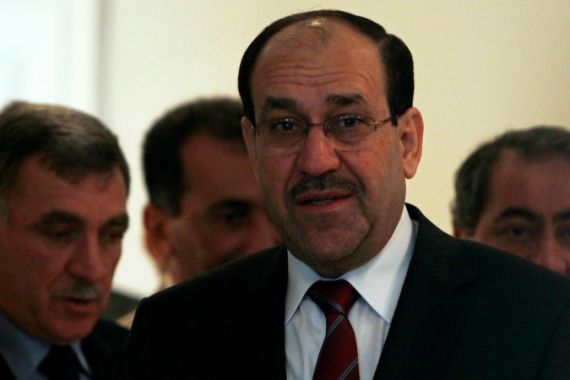Nouri al-Maliki’s ‘detention squad’
Reports show US worried that Iraqi prime minister uses his political power to crack down on rivals.

In October 2006, an Iraqi army unit reportedly robbed a number of people living in Sunni neighbourhoods in western Baghdad. The unit was arrested on October 11 – and told its captors that it was operating under the authority of Iraqi prime minister Nouri al-Maliki.
1/5/6 IA patrol stops 2X IA M1114s and 1X pick up truck occupied by 17X LNs in IA uniforms and equipment. 5/6 orders detenftion of all 17 individuals and vehicles due to reports over several days of 2X IA M1114s conducting robberies in the Mansour and Washash areas of 5/6 IA battle space.
[…] Detainees claim to be Iraqi special forces working for the prime minister’s office.
The unit seems to be a sort of “detention squad” operating under al-Maliki’s authority. An official from the defence ministry showed up several hours later and urged the US to release the men, saying their mission was “directed by PM Maliki”.
Keep reading
list of 4 itemsMyanmar Army on the Ropes
Slapped: Speaking Up In Thailand
Slovakia: The Return of Fico
Politics, unsurprisingly, factors little into these leaked documents: They are ground-level assessments from army units, far removed from the government.
Still, some of the reports paint the Iraqi prime minister in an unflattering light, which may be why al-Maliki and his allies have described them as a smear campaign. “These are all just fakes from the Internet and Photoshop,” Hassan al-Sneid, a member of al-Maliki’s State of Law coalition, said on Saturday.
Al-Maliki himself also responded to the documents, saying their release was designed to undermine his bid for a second term as prime minister.
“Cracking down on Sunnis”
US troops are clearly worried that al-Maliki is using his political power as a cudgel against his rivals, particularly Sunnis.

- Glossary: Military jargon
- Editor’s note: About the documents
In May 2009, for example, the governor of Ninewa province, Athiel al-Najafi – a Sunni from the al-Hadba party – visited a Kurdish-controlled area northeast of Mosul. “[The Kurdistan Regional Government] perceive this action to be a challenge to the Kurdish government,” a US intelligence report notes, and goes on to say that Kurdish peshmerga units have been called in to prepare for a possible “confrontation” with the governor.
Despite the apparent danger, though, al-Maliki – who considers the Kurds an important political ally – refused to provide police protection for al-Najafi. Quite the opposite: He orders Iraqi police units not to protect the governor. (They ignored his orders and provide protection anyway.)
The following month, a lieutenant colonel in the Iraqi police – and five other officers – were arrested in their homes. All of them were allegedly former members of the Baath party, and the Iraqi army said they had “247 [criminal] charges” against them.
A US intelligence officer, assessing the arrests in a classified report, said the roundup could be perceived as a sectarian power grab.
However, the second thing it could demonstrate is that PM Maliki, who is rumored to be using his power to forcefully advance Shia interests in Iraq, is cracking down on Sunnis who he perceives as a threat. The fact that the PM ordered the arrest makes it that much more suspicious.
The arrests were assessed as a “neutral to negative IO [information operations] event,” meaning that they would likely have a negative influence on Iraqi perceptions of the al-Maliki government.
A frequent target
The frequent crackdowns on his political rivals help to explain why al-Maliki was the target of so many often-violent plots. Dozens of reports describe assassination attempts; others, plots designed to intimidate the prime minister into changing his policies. Not all of them have been previously reported.
Some of the plots come from Sunni groups: In April 2007, a loose coalition of Sunni groups allegedly plotted against the prime minister. The militants planned to stage a “coordinated attack” in Baghdad’s middle-class Adhamiyah neighbourhood.
All the militant cells are affiliated with al-Qa’ida in Iraq, execpt for Jaysh al-Islami and the Ba’ath party cell… on 06 April 2007, the Sunni militant cells warned local Adhamiyah area shop owners and residents to stay out of the area if at all possible on these dates. The purpose of the attack is to demonstrate the Sunni displeasure in Iraqi prime minister Maliki…
But Shia groups also targeted al-Maliki – particularly Jaysh al-Mahdi (JAM), the armed wing of populist Shia cleric Moqtada al-Sadr’s movement. An October 2006 report describes a “death squad leader” from JAM who was “tasked by the authority of a fatwa to organise the public assassination of Iraqi prime minister Nuri Kamal al-Maliki.”
Al-Sadr also worked to stir up public sentiment against the prime minister. One report recounts a Friday prayer sermon in Baghdad in July 2009. The unnamed imam who delivered the sermon was a member of al-Sadr’s movement.
Today’s sermon had a different tempo from the previous weeks. Normally the imams would talk about the mistreatment of the prisoners, the lack of electricity, how good the GoI is living and CF continuing to be seen in the city. This week the sermons seemed more directive [sic] toward PM Maliki.
With electricity, water and other public services in woeful condition, al-Maliki has focused on improved security as a centrepiece of his political platform. So more recent reports show insurgent groups trying to use deadly attacks to “discredit” him.
Last September, for example, four people were killed when an IED exploded underneath their black BMW.
It is assessed that this vehicle was targeted by an unknown rejectionist group for the purpose of discrediting the current government under prime minister Maliki before the upcoming elections.
This strategy – “discrediting” al-Maliki – helps to explain insurgents’ growing use of assassinations and high-profile mass-casualty attacks against government targets in Baghdad. Both reinforce the notion that the government is incapable of providing basic security.